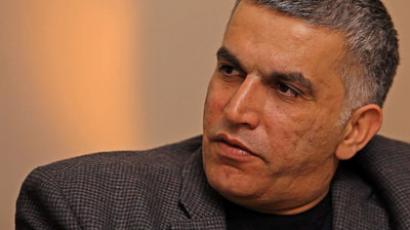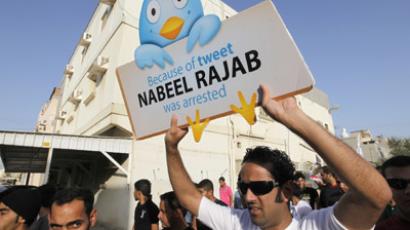‘Bahrain activist crackdown on rise’
Bahrain is intensifying its crackdown on the pro-democracy opposition and is trying to silence those covering its actions, Jen Marlowe, a US documentary filmmaker who was kicked out of the country, told RT.
Marlowe, who has covered a number of conflicts, including in Darfur and Palestine, was expelled from the country after Bahraini authorities accused her of shooting a film without proper visa documentation.In her first televised interview since her expulsion, she told RT how brutal the crackdown on the protesters in the country was. RT: What was the situation like during your stay in Bahrain?Jen Marlowe: I spent about three weeks in Bahrain and I was largely embedded with pro-democracy and human rights activists while I was there. And what I witnessed was an increasing repression against the pro-democracy and human rights activists. In the short time that I was in Bahrain, I felt like the situation was actually deteriorating, and house raids and arrests and attempts to silence free speech are intensifying now in Bahrain.RT: How widespread is the crackdown?JM: It is extremely widespread. In villages, in towns, all over Bahrain, there is violent repression of attempts to demonstrate, and attempts to protest, and even more alarming is the increase of the number of house raids. In the middle of the night, riot police come over and surround houses, brutally arrest people, and imprison them, take people from restaurants, swimming pools, their private homes. This practice of targeting activists and demonstrators seems to be on the rise and very widespread right now.RT:How much more punishment can the opposition take before their movement either loses momentum or just becomes too dangerous?JM: They’ve been going for 17 months now, going strong. Actually the word “sumud”, meaning “endurance” or “steadfast”, is the catchphrase of the Bahraini revolution. It did not see any signs of slowing down or losing stamina. In fact, I saw signs of people being reenergized and being committed to the long-term sacrifices that are needed for the struggle for democracy. And only time will tell how long they will be struggling, but I did not see any signs of people giving up, I saw signs of people reinvigorated.RT: You’ve also written that the police made little distinctions between children and adults. Can you give some details?JM: From what I could see there was absolutely no distinction between civilians of any kind. What I saw happening in demonstrations was the police arbitrarily firing tear gas canisters not as a method of crowd dispersal, but firing them directly at crowds, and so whoever ends up being in the way ends up getting hit, whether that’s a 13-year-old boy, or a 15-year-old, or a woman or a man. These tear gas canisters are being used as ammunition and sound grenades, as well as bird shot, not as methods of crowd dispersal.RT: Why is the regime very determined to keep human rights activists such as you out of the country?JM: I think the Bahraini regime is very determined not to let anything that’s happening be exposed, and so anyone that’s going to Bahrain with the purpose and the agenda of trying to show what’s happening and trying to really expose the reality on the ground, the regime wants to keep them out and keep them silent as much as possible.RT: Now that you have no access to the country, how will you continue to work?JM: The irony about this is that they deported me as I was leaving anyway. They caught me in the airport at passport control, getting ready to get on to the plane. So I had already completely what I had gone to Bahrain to do so I imagine the only reason they were detaining me at all was to see if they could squeeze information from me or to see if they could get footage from me, which, of course, they did not and could not. So I have a lot of work ahead of me, working on writing, working on editing, working to expose the stories that I had access to. And I’ll continue to do that work.














